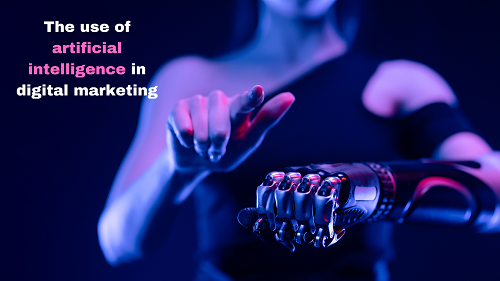Introduction to AI in digital marketing
As artificial intelligence (AI) continues to evolve, so too does its potential application in the field of digital marketing. With the ability to process and interpret large amounts of data quickly and accurately, AI can be used to improve a variety of marketing activities, from targeted advertising to website personalization.
In addition to increasing efficiency and effectiveness, AI can also help marketers keep up with the ever-changing landscape of digital marketing. By constantly monitoring trends and customer behavior, AI can provide insights that allow marketers to adjust their strategies on the fly and keep up with the competition.
While still in its early stages, AI is already having a major impact on digital marketing. As more companies begin to adopt AI technology, it is likely that its use will become even more widespread.
The benefits of using AI in digital marketing
When it comes to digital marketing, AI can be a powerful tool to help you automate and optimize your campaigns. Here are some benefits of using AI in digital marketing:
1. Automation: One of the main benefits of using AI in digital marketing is automation. With AI, you can automate tasks like email marketing, social media campaigns, and targeted ads. This can save you a lot of time and allow you to focus on other aspects of your business.
2. Optimization: Another benefit of using AI in digital marketing is optimization. AI can help you optimize your campaigns for better results. For example, if you’re running a Facebook ad campaign, AI can help you target your audience more effectively and get better results.
3. Personalization: Another advantage of using AI in digital marketing is personalization. With AI, you can personalize your messages and content to reach each customer on a more personal level. This can increase engagement and conversions.
4. Cost-effective: One final benefit of using AI in digital marketing is that it’s cost-effective. In many cases, using AI can actually save you money by automating tasks and optimizing campaigns for better results.
AI applications in digital marketing
Digital marketing is continually evolving, and artificial intelligence (AI) is playing an increasingly important role in its advancement. Here are some ways AI is being used in digital marketing:
1. Automated Insights
There are a number of software platforms that use AI to generate automated insights from data sets, including Google Analytics and IBM Watson Analytics. These insights can help marketers identify patterns and trends, and make better-informed decisions about their campaigns.
2. Predictive Analysis
AI can also be used for predictive analysis, which can help marketers anticipate what customers are likely to do in the future. This enables them to tailor their campaigns more effectively and focus on areas that are most likely to result in conversions.
3. Chatbots
One of the most visible applications of AI in digital marketing is chatbots. These computer programs can mimic human conversation, and are being used by brands to provide customer support, promote products/services, and even close sales. As chatbots become more sophisticated, they will become even more valuable tools for marketers.
4. Personalization
Personalization is another area where AI is making a big impact in digital marketing. By understanding a customer’s preferences and behavior, brands can deliver highly relevant content and experiences that are more likely to result in a sale or conversion.
5. Programmatic Advertising
Programmatic advertising is a form of online advertising that uses automation to buy ad inventory in real-time. AI is playing an
Personalization and targeting using AI
In order to provide a more personalized and targeted experience for users, many digital marketers are turning to artificial intelligence (AI). AI can be used to help identify user patterns and preferences, as well as to create and deliver customized content.
When it comes to personalization, AI can be used to identify individual user patterns and preferences. This information can then be used to create customized content that is more likely to resonate with the user. For example, if a user frequently visits your website during lunch breaks, AI can be used to send them tailored content during that time period.
Targeting is another area where AI can be extremely useful. By understanding user behavior, AI can help you target your content and ads to specific audiences. For example, if you know that a certain group of users is more likely to convert, you can target your ads and content specifically to them in order to increase the likelihood of conversion.
Overall, AI provides digital marketers with a powerful tool for personalization and targeting. By understanding user behavior and preferences, AI can help you tailor your content and ads for maximum impact.
The impact of AI on jobs in digital marketing
The use of artificial intelligence (AI) in digital marketing is growing. Many marketers believe that AI will have a major impact on their jobs in the near future.
Some of the ways that AI can impact digital marketing jobs include:
1. Automation of tasks: AI can automate many tasks associated with digital marketing, including tasks such as email marketing, social media campaigns, and ad targeting. This can free up time for marketers to focus on other aspects of their job.
2. Improved data analysis: AI can help marketers to better analyze data, identify trends, and make better decisions about where to allocate resources.
3. Creation of new roles: As AI continues to develop, it is likely that new roles will be created within digital marketing departments to manage and utilize AI tools effectively.
The ethical considerations of using AI in digital marketing
When it comes to the ethical considerations of using AI in digital marketing, there are a few key points to keep in mind. First and foremost, it’s important to be transparent with users about the fact that AI is being used in order to personalize their experience. Secondly, marketers need to be mindful of the potential biases that can exist within AI algorithms. Finally, it’s important to consider the privacy implications of using AI to collect and analyze user data.
Conclusion and future outlook
The use of artificial intelligence in digital marketing is still in its early stages, but the potential applications are already evident. As more companies adopt AI technology, we can expect to see even more innovative and effective ways to use it in marketing.
Some key benefits of using AI in marketing include the ability to personalize messages and content for individual customers, as well as the ability to automate repetitive tasks so that marketers can focus on higher-level strategy. Additionally, AI can help identify patterns and trends that would be difficult for humans to spot, making it a valuable tool for insight and decision-making.
Looking ahead, it’s clear that the use of AI in marketing will only continue to grow. As data becomes more plentiful and accessible, and as AI technology gets better at understanding and responding to human behavior, we can expect to see even more transformative changes in the way marketing is done.
Also Read:







